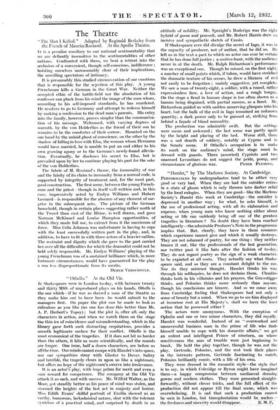" Othello." At the Old Vic.
Ir Shakespeare were in London to-day, with between twenty and thirty MSS. of unproduced plays on his hands, Othello is the one which—if he was as shrewd a man of the theatre as they make him out to have been—he would submit to the managers first. On paper the plot can be made to look as ridiculous as you like (no one has done this better than Mr. A. P. Herbert's Topsy) ; but the plot is, after all, only the characters in action, and when we watch them on the stage the thin ice of coincidence and misunderstanding, which in the library gave forth such distracting crepitations, provides a smooth legitimate surface for their conflict. Othello is the most economical of the tragedies. If it does not hit us harder than the others, it bits us more scientifically, and the rounds are longer. One issue, half a dozen characters, are before us all the time. Our minds cannot escape with Hamlet's into space, nor our sympathies stray with Gloster to Dover. Sultry and terrible, the tragedy closes in upon us like a nightmare, but offers no hope of the nightmare's swerve into irrelevance.
It is an actor's play, with huge prizes for merit and even a sure reward for competence. The company at the Old Vic attack it as such, and with success. Mr. Wilfrid Walter, as the Moor, got steadily better as his peace of mind was stolen, and 'stormed the heights of the last act in majesty and honor. Miss Edith Evans' skilful portrait of 'Emilia showed us an earthy, humorous, lackadaisical nature, shot with the tolerant eynicism of a Mactieal mind,.mul surprised by death in an attitude of nobility. Mr. Speaight's Roderigo was the right hybrid of goose and peacock, and Mr. Robert Harris drew on incisive and sympathetic sketch of Cassio.
If Shakespeare ever did divulge the secret of Iago, it was in the capacity of producer, not of author, that he did so. Ile left us in the text a part to which no actor can ever be certain that lie has done full justice ; a Motive-hunt, with the audience never in at the death. Mr. Ralph Richardson's performance was an exceptional one. Though he missed, on the first night, a number of small points which, if taken, would have enriched the dramatic texture of his scenes, he drew a likeness of evil not easily to be forgotten ; mainly suggestive, yet complete. We saw a man of twenty-eight, a soldier; with a round, rather expressionless face, a love of action, and a rough tongue. On the stage a fiend in Mullen shape is too often shown as human being disguised, with partial success, as a 'fiend. Mr. Richardson guided us with sudden unnerving glimpses into his heart, but the bulk of the evil in Imo remained an unknown
. • quantity, a dark power only to be guessed at, striking from behind a façade of bland normality.
The production was admirably swift. But the settings were mean and awkward ; the last scene was partly spoilt, by the height and 'placing of the bed. Wirie Still, there was a sad dearth of soldiery, notably at Cyprus and in the Senate scene. If Othello's occupation is to make its mark on the audience's mind, the stage must be dressed with guards. Three (assorted) Cypriots and two unarmed Levantines do not suggest the pride, pomp, and


















































 Previous page
Previous page